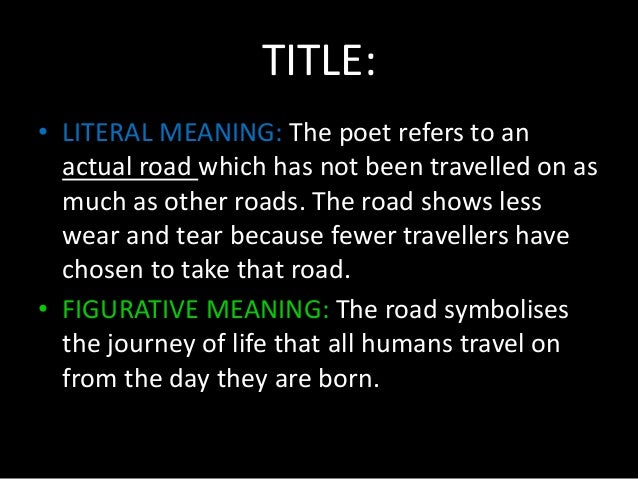

It subtly presents that whichever path one chooses, they will miss something on the other. Though overtly, the poem appears to guide a person about making life choices, this impression given in it is ironic. The poem “The Road not Taken,” published in the poetry collection Mountain Interval, received much critical attention due to its ambiguous and ironic nature. He would also exclaim that his decision to choose the road less traveled caused the differences in his life. He says that he might think about this choice with a sigh in his life. In the final stanza, the speaker describes the future. Nevertheless, there is a contradiction in the next line as the speaker says that a return to the first road is least probable as roads give way to another. The speaker also says that he has kept aside the first road to be traveled some other day. It was because the people did not walk over it. He states that both the roads were filled with leaves and had not turned black.

He recalls the paths as he saw them in the morning. However, as he moved on, he understood that the two roads were worn out equally. According to the speaker, this path was more appealing and had a better claim. He had to try hard to see through the road as it was bending, and the trees were blocking the view.Īfter a certain amount of contemplation, the speaker chooses the grassy path that is less worn out. So, the speaker stood staring at the road for a long time and tried to see where the paths lead.

The speaker feels sorry as he cannot travel two roads simultaneously and has to choose one among the two roads. At some point in his walk, he sees a road diverging into two. The poetic persona is walking through the woods, whose leaves have turned yellow and began to fall. The Road Not TakenĪnd that has made all the difference. The poem subtly delights as well as indulges the reader in an inquiry. Similarly, “The Road not Taken” has blended images from life and nature to explain a person’s dilemma when they have to take a crucial turn in his/her life. Most of the poems written by Robert Frost reflect social and philosophical themes such as individualism, nature, isolation, morality, the quest for self-knowledge, and everyday struggles. The poem compares a person’s life choices with two diverging roads in the woods and explains how choosing the road less traveled makes a difference. His poem “The Road not Taken,” published in 1916, is one of his masterpieces, and it describes the nature of choices one makes in life. We want to hear what you think about this article.Robert Frost was a 20th-century American poet who was well-known for his realistic portrayal of nature and country life. It is now widely considered to be one of the most popular works of American literature. “The Road Not Taken” was originally published in The Atlantic in 1915 along with two other poems from Frost. It’s a commentary on the self-deception we practice when constructing the story of our own lives.” In the final stanza, we can’t know whether the speaker is sighing with contentedness or regret as he justifies the choices he’s made and shapes the narrative of his life.įrost wrote the poem to tease his chronically indecisive friend, Edward Thomas, who misinterpreted the meaning and enlisted in the military shortly thereafter, only to be killed two years later in WWI. In fact, the critic David Orr deemed Frost’s work “the most misread poem in America,” writing in The Paris Review: “This is the kind of claim we make when we want to comfort or blame ourselves by assuming that our current position is the product of our own choices… The poem isn’t a salute to can-do individualism. But as Frost liked to warn his listeners, “You have to be careful of that one it’s a tricky poem-very tricky.” In actuality, the two roads diverging in a yellow wood are “really about the same,” according to Frost, and are equally traveled and quite interchangeable. This interpretation has long been propagated through countless song lyrics, newspaper columns, and graduation speeches. Robert Frost’s poem “The Road Not Taken” is often interpreted as an anthem of individualism and nonconformity, seemingly encouraging readers to take the road less traveled.


 0 kommentar(er)
0 kommentar(er)
